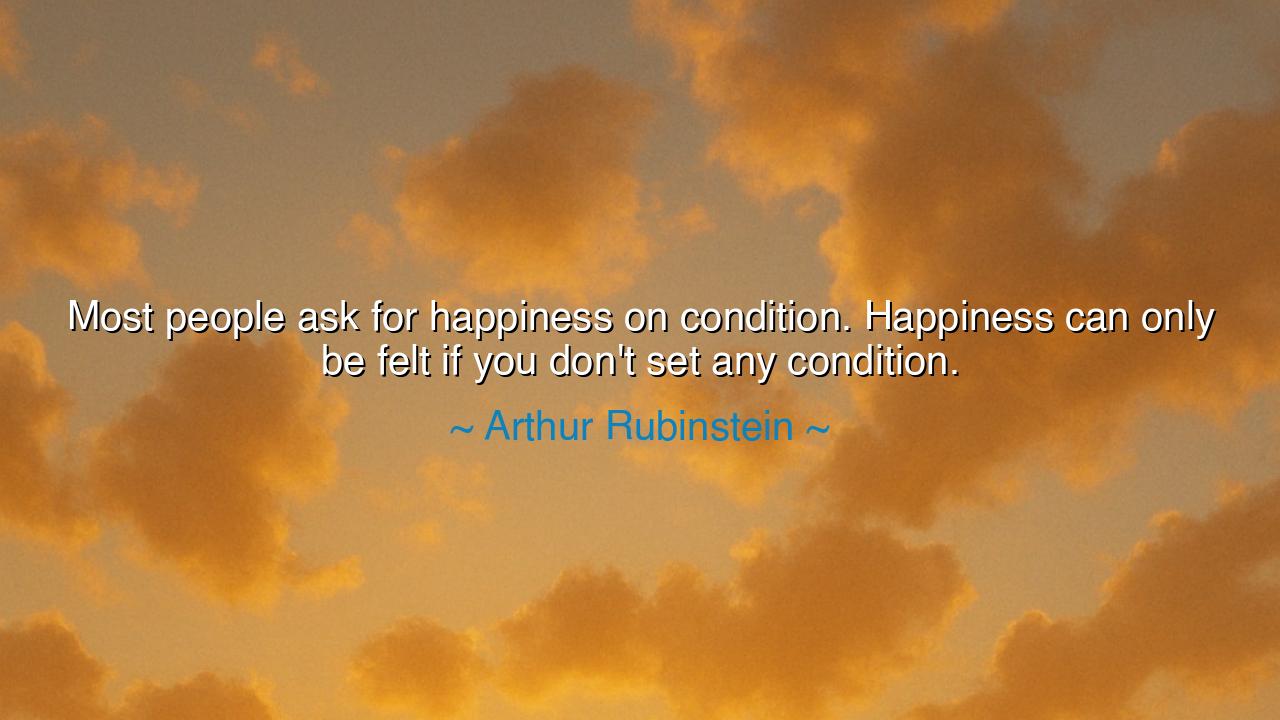
Most people ask for happiness on condition. Happiness can only be
Most people ask for happiness on condition. Happiness can only be felt if you don't set any condition.






When Arthur Rubinstein, the great pianist whose fingers once danced across the world’s grandest stages, said, “Most people ask for happiness on condition. Happiness can only be felt if you don’t set any condition,” he struck upon a truth as profound as any melody he ever played. His words echo with the wisdom of both artist and sage — for they reveal that happiness is not something the world gives, but something the soul allows. The human heart, in its restlessness, often bargains with life: “I will be happy when I am loved… when I succeed… when my sorrows end.” Yet Rubinstein reminds us that such bargains are futile, for conditional happiness is not happiness at all, but dependence in disguise.
The ancients knew this long before the age of concert halls or cities of light. The Stoics of old — Epictetus and Seneca — taught that to tie one’s joy to the turning of fate is to build a temple upon shifting sands. True happiness, they said, comes from freedom — not the freedom of circumstance, but the freedom of the heart that no longer demands. Rubinstein’s insight carries the same eternal music: to be happy only when conditions are met is to live as a prisoner of events. But to release all conditions is to step into the vastness of peace, where joy flows not from having, but from being.
Think of Rubinstein himself — a man who, though surrounded by glory, did not worship it. He played before kings, yet his joy was not in the applause, but in the music itself. In his later years, when his eyesight dimmed and his hands trembled, he did not curse fate; he said instead, “I have learned to love the imperfections of life.” It was then that he found a serenity deeper than the ovations of youth. His happiness was unconditional because it was rooted in gratitude, not achievement. He lived not by asking the world to please him, but by delighting in the simple miracle of existence.
There is a story of the Buddha, who once sat beneath a tree and was asked what happiness truly is. He replied, “When you stop clinging, you stop suffering.” Rubinstein’s words sing the same refrain — that happiness dies where expectation begins. The mind that says, “I will be happy when…” closes its own door to joy, while the heart that whispers, “I am grateful now,” opens its windows to eternity. To remove conditions is to see life as it is — imperfect, fleeting, unpredictable — yet still wondrous. This is not ignorance of pain; it is mastery over it. For the wise do not wait for storms to pass — they learn to dance in the rain.
To live without condition requires courage, for it means surrendering control — the illusion that we can dictate the rhythm of life. It means loving without guarantee, working without certainty, and smiling even when dreams wither. But those who live thus discover a paradox: in giving up control, they gain peace. The river of life flows freely, and they flow with it, no longer fighting the current. The unconditional heart becomes like a clear sky — the storms may come, but they pass through without staining its blue.
We see this same spirit in the lives of saints and artists, of mothers who love without return, and of wanderers who find beauty in every sunset, even when the day was hard. They have learned that happiness is not a destination, but a state of readiness — the readiness to receive the moment exactly as it is. Such souls walk lightly, for they carry no chains of “should” or “must.” Every breath becomes a gift; every sorrow, a teacher. Their joy is quiet, steady, and unbreakable — because it is not borrowed from circumstance, but born from the depths of understanding.
So, my listener, when you seek happiness, do not ask it to arrive in perfect form. Do not say, “I will be happy when I am rich,” or “when I am free of pain.” Say instead, “I will be happy now, in this imperfect hour.” For life will never cease to test you, and conditions will always shift. But the soul that has learned to rejoice without requirement — that has learned, like Rubinstein, to find music even in silence — will never be poor in spirit. Remember this ancient truth: Happiness is not found by demanding from life, but by embracing it. Let your heart set no conditions, and it will find peace in all seasons.






AAdministratorAdministrator
Welcome, honored guests. Please leave a comment, we will respond soon